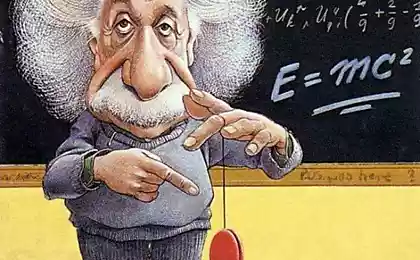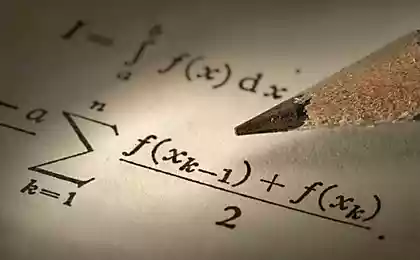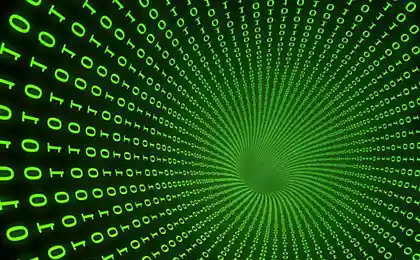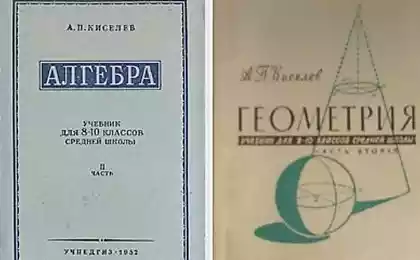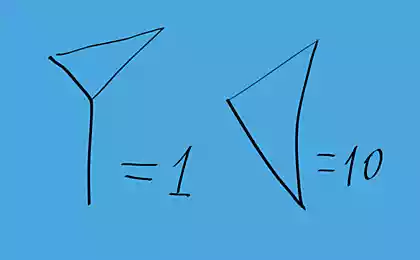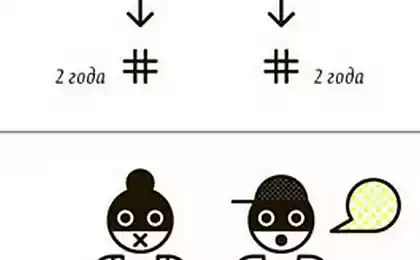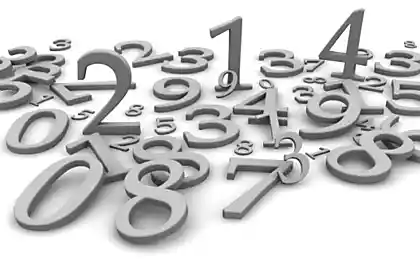804
On the diagonal of the square
The introduction of the complex numbers was not the first revolution in the understanding of human nature numbers. For two thousand years before this powerful shock to experience the world of Greek mathematics.
Trouble began the Pythagoreans did not immediately. Pythagoras founded a scientific school eventually ended badly, but today the story is not that cheerful massacre that was committed over the Pythagoreans thankful for the education of the people, and a greater degree of spiritual twists and turns.
The term "scientific school" in relation to an organization founded by Pythagoras, is a such a euphemism. Sensibly by looking at its structure and applied technology, Pythagoreanism be safely attributed to the totalitarian cults, which was quite in the spirit of the time (however, it is always in the spirit of the times, timeless classics). Be present and the degree of separation of initiation, and a complex system of rituals with restrictions (for example, well-known, such as "do not have beans" or "do not bite off from the whole loaf"), and complex philosophical doctrine. Hi Ron Hubbard companions. Nothing new under the sun.
In general, during the life of Pythagoras his "school" was solid now, besides having a significant and constantly growing political influence.
In general, the philosophy of Pythagoras had a significant impact on Western culture (and to us as well). Many ideas have been developed in classical Greek philosophy, and already know the Pythagorean theorem about everything. The expression "harmony of the spheres", by the way, also goes back to the Pythagoreans.
One of the essential elements of their philosophy was the idea that any number can be represented as a ratio of two integers, that is a simple fraction. In this they, including saw nature of perfection. Moreover, it seems to be quite obvious. In modern mathematics such numbers are called rational, and their set is denoted by the symbol . Make now pause for a few seconds, think about where all should be, that is not true? Can you give an argument that would be convincing enough for the ancient Greeks? Or, at least, convincing enough for myself, personally?
In general, the world of numbers was simple, elegant, and everyone was happy. The source of the trouble appeared unexpectedly, has already become the aforementioned theorem, which bears the name of Pythagoras, one of the most important extant, his achievements. Unfortunately, the proof of the Pythagorean we do not know. The oldest extant - is given in the "Elements" of Euclid and dated 3. BC Let me remind you, Pythagoras himself lived in the 6th century. BC
A fragment of the Vatican Manuscript Number 190, dated 10. BC (Entirely здесь):
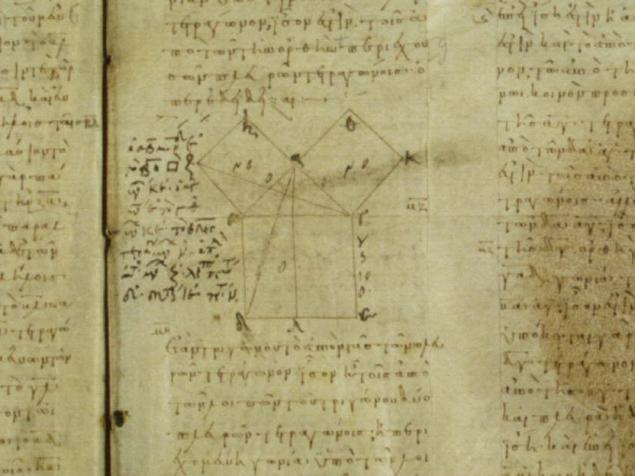
The proof of Euclid is not an easy job. There is reason to believe that he knew the way and easier, but because of methodological considerations led this option, showing, besides the Pythagorean theorem, and some other interesting ideas.
However, back to the Pythagoreans.
Just imagine a simple thing: a square with sides of length. If we denote the length of the diagonal, the Pythagorean theorem we obtain:
and, accordingly:
It goes something by itself it is not a problem. From the point of view of the Pythagoreans, we will just have to find integers and such that

Here on this kind of "simple" point and everything came to a halt. And tight. This lasted until the stopper until one wise man (allegedly Hippasus also Pythagorean), not proved, suddenly, that these numbers do not exist. All evil comes from a helluva lot of clever, as you know. According to legend, this scientific achievement so shocked colleagues that, to mark the recognition of scientific merit, without delay Hippasus thrown overboard, at which time he was in his mathematical insights sailed. But there was nothing to spoil respected people, undermine the foundations so lovingly nurtured and highly profitable system of philosophy.
Now, the number is not represented as a ratio of two integers, called irrational.
Some time even the Pythagoreans kept secret the fact irrationality. However, the murder will out, and the truth is pretty fast (by historical standards) has found a way out.
Prove the irrationality is not difficult.
Suppose that there exist such that

Moreover, we assume that at least one of the numbers - odd. If this is not the case, the numerator and denominator can always be reduced by 2 (the right amount of time).
Then we obtain:

here:
Thus, - an even number. But then - even.
By hypothesis, the oddness of at least one of the numbers, we find that - odd.
By parity can be written
,
where - a whole.
But then:
hence
But this means that - even, and even so. Contradiction.
The number of impossible i> represented as a ratio of two integers.
It remains to add that - this is not some strange freak. It can be shown that the more irrational numbers than rational, more fundamentally. Incidentally, the ratio is greater than, less than in the world of infinite sets itself is very kontrituitivnym. But that's another story.
PS. I take this opportunity to congratulate habrovchan on coming. Good luck in the new year!
Source: habrahabr.ru/post/246963/
Trouble began the Pythagoreans did not immediately. Pythagoras founded a scientific school eventually ended badly, but today the story is not that cheerful massacre that was committed over the Pythagoreans thankful for the education of the people, and a greater degree of spiritual twists and turns.
The term "scientific school" in relation to an organization founded by Pythagoras, is a such a euphemism. Sensibly by looking at its structure and applied technology, Pythagoreanism be safely attributed to the totalitarian cults, which was quite in the spirit of the time (however, it is always in the spirit of the times, timeless classics). Be present and the degree of separation of initiation, and a complex system of rituals with restrictions (for example, well-known, such as "do not have beans" or "do not bite off from the whole loaf"), and complex philosophical doctrine. Hi Ron Hubbard companions. Nothing new under the sun.
In general, during the life of Pythagoras his "school" was solid now, besides having a significant and constantly growing political influence.
In general, the philosophy of Pythagoras had a significant impact on Western culture (and to us as well). Many ideas have been developed in classical Greek philosophy, and already know the Pythagorean theorem about everything. The expression "harmony of the spheres", by the way, also goes back to the Pythagoreans.
One of the essential elements of their philosophy was the idea that any number can be represented as a ratio of two integers, that is a simple fraction. In this they, including saw nature of perfection. Moreover, it seems to be quite obvious. In modern mathematics such numbers are called rational, and their set is denoted by the symbol . Make now pause for a few seconds, think about where all should be, that is not true? Can you give an argument that would be convincing enough for the ancient Greeks? Or, at least, convincing enough for myself, personally?
In general, the world of numbers was simple, elegant, and everyone was happy. The source of the trouble appeared unexpectedly, has already become the aforementioned theorem, which bears the name of Pythagoras, one of the most important extant, his achievements. Unfortunately, the proof of the Pythagorean we do not know. The oldest extant - is given in the "Elements" of Euclid and dated 3. BC Let me remind you, Pythagoras himself lived in the 6th century. BC
A fragment of the Vatican Manuscript Number 190, dated 10. BC (Entirely здесь):

The proof of Euclid is not an easy job. There is reason to believe that he knew the way and easier, but because of methodological considerations led this option, showing, besides the Pythagorean theorem, and some other interesting ideas.
However, back to the Pythagoreans.
Just imagine a simple thing: a square with sides of length. If we denote the length of the diagonal, the Pythagorean theorem we obtain:
and, accordingly:
It goes something by itself it is not a problem. From the point of view of the Pythagoreans, we will just have to find integers and such that

Here on this kind of "simple" point and everything came to a halt. And tight. This lasted until the stopper until one wise man (allegedly Hippasus also Pythagorean), not proved, suddenly, that these numbers do not exist. All evil comes from a helluva lot of clever, as you know. According to legend, this scientific achievement so shocked colleagues that, to mark the recognition of scientific merit, without delay Hippasus thrown overboard, at which time he was in his mathematical insights sailed. But there was nothing to spoil respected people, undermine the foundations so lovingly nurtured and highly profitable system of philosophy.
Now, the number is not represented as a ratio of two integers, called irrational.
Some time even the Pythagoreans kept secret the fact irrationality. However, the murder will out, and the truth is pretty fast (by historical standards) has found a way out.
Prove the irrationality is not difficult.
Suppose that there exist such that

Moreover, we assume that at least one of the numbers - odd. If this is not the case, the numerator and denominator can always be reduced by 2 (the right amount of time).
Then we obtain:

here:
Thus, - an even number. But then - even.
By hypothesis, the oddness of at least one of the numbers, we find that - odd.
By parity can be written
,
where - a whole.
But then:
hence
But this means that - even, and even so. Contradiction.
The number of impossible i> represented as a ratio of two integers.
It remains to add that - this is not some strange freak. It can be shown that the more irrational numbers than rational, more fundamentally. Incidentally, the ratio is greater than, less than in the world of infinite sets itself is very kontrituitivnym. But that's another story.
PS. I take this opportunity to congratulate habrovchan on coming. Good luck in the new year!
Source: habrahabr.ru/post/246963/
Thermal barriers, tombstones and other delights of printed circuit boards
When the technology needs ahead: how to think about the development of IT in 1985
